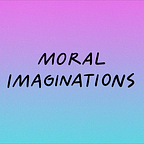Camden Imagines Participant Blogs
It’s not about doing things better, it’s about doing better things
Imagination in the workplace — by Neelam Kumar
This blog is part of a series written by the participants of the Camden Imagines programme. This eight week training introduced council officers and public servants to the skills of collective imagination and horizontal leadership to empower them to become agents of change in the borough.
Dr Neelam Kumar is part of the Educational Psychology Service (EPS).
The team provides specialist advice to support schools, colleges and early years’ providers to identify, assess and meet the needs of children and young people with special educational needs and disabilities (SEND) aged 0–25. They address concerns about developmental, behavioural, emotional and mental health needs, including those with the most complex needs, drawing on psychological theory and research to inform their practice. In this blog, she writes about how the Camden Imagines programme caused her to reflect on the nature of change and using imagination in the workplace.
“It’s changing something about you, not just in the workplace, but outside of the workplace too.”
In the beginning
In my experience, imagination is not usually a word that is used in a work context. Imagination is something that is seen as something you do outside of the workplace. At the very most, it would sit at the periphery of work.
I was excited to start the Camden Imagines course and at the same time reserved as I did not know what to expect. Now that the course has finished and I’m reflecting back, I would describe the course as a slow burner. Something is happening, slowly in the background. You are unsure of what to make of it all, but there is a shift. It’s hard to pinpoint the change, but there is a change. It’s changing something about you, not just in the workplace, but outside of the workplace too.
What I noticed and learnt
With most new learning and new ways of being, you try to hook onto existing frameworks that you have. New learning and change on this course very much began with me, myself and I! In the earlier weeks this is what I was experiencing. The shift over the weeks and more recently has been on the changes in the workplace and how to introduce imagination in my everyday life.
A fellow imagination activist shared a quote, “It’s not about doing things better, it’s about doing better things.” This really stuck with me. I have been trying to improve on what we already have in place, but failed to ask if what we have in place is what we need or is best suited. When you think in this way, you are opening up your imagination and making changes that fit the current context.
Creating time for imagination has actually allowed a wider direction of thinking. As adults we are often forced to think in a particular way, to constrain our thinking. I’ve found that activities which are fun actually allow you to be less reserved and conditioned, and this warms you up to think differently. This is certainly something I will be introducing into team meetings!
The “need to create the longing” and “need the narrative first.” These sentences also really stuck with me, thanks to Rob Hopkins! I was thinking about an example at work where I had the narrative and created the longing, after a few years what I wanted to see happen actually came back to me, full circle! I didn’t have a framework for this and these two comments created a structure and deeper understanding for me which really resonated. This gives me hope. I feel confident in creating a narrative, however ridiculous it may seem at the beginning. There is something happening here to do with conviction and self-belief.
Final thoughts & reflections
As the course is ending, my reflections are… “how do I create time and space?” If I’m being honest, continuing with my regular commitments on top of attending this training has been a real juggle and has really tested my resilience.
How do I give myself permission to use my imagination without the pressure to feel like I have to deliver? To be truly imaginative, with a view of driving change requires time and rumination of thoughts and ideas. Do we really have permission for this in the workplace? I feel like I have a few ideas festering as to how I can put some of the tools in practice which I’m excited about. It feels like the start of something.
Neelam Kumar
This blog is part of a series written by Camden’s Imagination Activists as part of their Imagination Activism programme called “Camden Imagines”. To read the other blogposts in the series, please visit this link.
